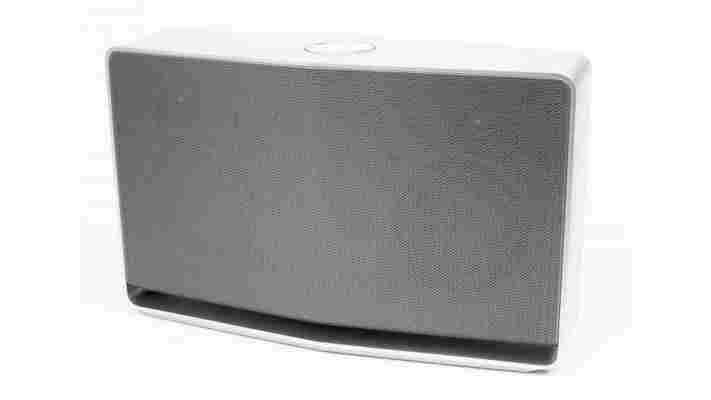The LG H7 is part of the company’s range of Music Flow multiroom speakers, sitting at the top-end. It’s considerably larger and outputs far more power than the compact H3, so it’s the better choice if you’re looking for a speaker for a large room.
Measuring 370x110x232mm, it’s comparatively light at 4.1kg, largely because it has a plastic finish, rather than metal speaker grilles. It still has a very attractive design, with a large rectangular front face that looks flat but is actually two slightly angled sides that meet in the centre. This is reflected on the back, making the H7 an irregular hexagon.
The H7 has more connectivity options compared to the H3. While the H3 only had an Ethernet port for wired networking, the H7 supplements this with an auxiliary connection for wired audio devices, which will be useful if you want to connect a wired device quickly to the speaker. There’s also Bluetooth connectivity to make a wireless direct connection to the speaker with a convenient NFC point for quick-pairing. The top of the H7 is uncluttered with just a jog wheel for volume control with a power button in its centre that also changes input sources.
The back of the speaker has a button for connecting the H7 to your Wi-Fi network and a separate button for adding the H7 as an additional speaker to a multiroom audio setup. The latter requires a LG Music Flow R1 Bridge (£40, www.currys.co.uk ) to create a dedicated wireless mesh network. While this makes a multiroom system more reliable, it’s an extra expense you have to be aware of.
To set up the H7 you can use the LG Music Flow app available on iOS and Android. There’s also desktop software available for PC, which acts as a media server, but no official software available for Macs, which was disappointing. Instead you can download Nero MediaHome from the LG website if you need to share music from your Mac, although any DLNA media server on PC, Mac or for your NAS will do the job. Instructions for adding the H7 and any other Music Flow speakers to your network are simple to follow and require you to go to each speaker and press the ‘Add’ button to pair it with the R1 Bridge. Within a few minutes you have speakers connected and available to stream to from the app.

